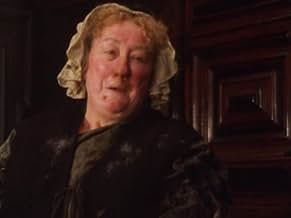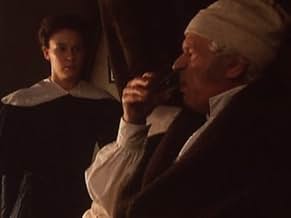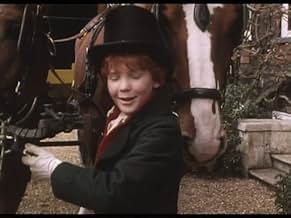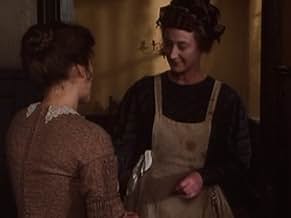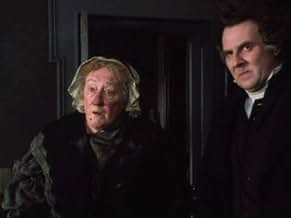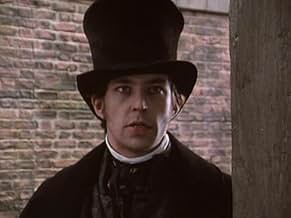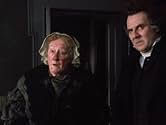Martin Chuzzlewit
- Minissérie de televisão
- 1994
- 6 h 25 min
AVALIAÇÃO DA IMDb
8,1/10
1,1 mil
SUA AVALIAÇÃO
Adicionar um enredo no seu idiomaOld Martin Chuzzlewit is nearing his death. Who will inherit his riches? With such a prize to play for, the Chuzzlewit family bring forth all of their cunning, greed and selfishness. Adapted... Ler tudoOld Martin Chuzzlewit is nearing his death. Who will inherit his riches? With such a prize to play for, the Chuzzlewit family bring forth all of their cunning, greed and selfishness. Adapted from the novel by Charles Dickens.Old Martin Chuzzlewit is nearing his death. Who will inherit his riches? With such a prize to play for, the Chuzzlewit family bring forth all of their cunning, greed and selfishness. Adapted from the novel by Charles Dickens.
- Indicado para 1 Primetime Emmy
- 2 vitórias e 6 indicações no total
Explorar episódios
Avaliações em destaque
In 1842 Charles Dickens was at a critical point in his career. His attempt at a series of stories told by different characters to each other, "Master Humphrey's Clock", was not a success, although it produced a popular novel ("The Old Curiosity Shop"), and a first attempt at a historical novel ("Barnaby Rudge"). He decided to take a trip to the United States.
The results was bad. He found Americans thievish for not giving him copy-write protection. He found them hypocrites for screaming for freedom, but winking at slavery. He found their cities far less acceptable than the English ones. There was less gentility. There was more rough edged belligerence (especially to the old enemy: England). He hated it. He returned to England and wrote "American Notes". The book roundly attacked the Americans. He was not forgiven for years.
He compounded the act in his next novel, "Martin Chuzzlewit", from 1843 - 1844. In this period, ironically, he was to start writing his small Christmas novels, the first of which ("A Christmas Carol") would become immortal - far more than "Chuzzlewit" actually did. But "Chuzzlewit" is regarded by critics as the best of Dickens comic novels. Yet if one person out of five reads the novel today I'd be surprised.
The novel deals with young Martin Chuzzlewit (Ben Walden), who is apprenticed to his cousin the architect Seth Pecksniff (Tom Wilkinson). Pecksniff is the British equivalent of Moliere's Tartuffe - the arch-hypocrite. As "tartuffel" is the term based on Moliere's character, so is the word "peck-sniff" due to Dickens (in "You Can't Cheat An Honest Man", an angry Mr. Belgoody - Thurston Hall - tells off Larson E. Whipsnade - W.C.Fields - calling him both a tartuffel and a peck-sniff). Pecksniff, pretending to be religious and good, back-stabs his way through the novel, stealing ideas from other architects (including Martin), and pushing his plans to gain control over Old Martin (the grandfather of the hero), a wealthy, retired merchant. Old Martin is played by Paul Schofield. Schofield also plays Old Martin's younger brother Anthony, who has a son Jonas (Keith Allen). Jonas wants to inherit too.
Dickens had demonstrated a grasp at the criminal mind in his handling of Bill Sykes and Fagin in "Oliver Twist". But the burglar and the thief trainer were relatively simple types (although Sykes fury at Nancy and his subsequent self-destruction was unique for British literature at that time). Jonas was a higher class criminal - a murderer who did it for money, not anger. He first destroys Anthony, and then goes after his cousin Montague Tigg, a cousin who is a swindler and a blackmailer. The killing of Tigg (whom Jonas ambushes while he is riding in a gig) is based (somewhat) on the murder of William Weare by John Thurtell in 1823. But there is more than that in Jonas. He is rejected by Pecksniff's daughter Charity (nicknamed Cherry / played by Emma Chambers), who subsequently gives in to his courting - only to discover he pursued her to punish her for initially rejecting him. He is blackmailed by Tigg into investing in a financial swindle, and purposely pulls his father-in-law Pecksniff into the swindle because he hates the man. Dickens made Jonas an in depth study of evil, and he becomes a center of fascination in the plot.
Meanwhile Young Martin goes to America when he breaks with the thieving Pecksniff. He goes with his friend Mark Tapley (Steve Nicholson). They find nothing likable about Americans who are nasty brutes for the most part. They have bought land from the Eden Land Company, only to find it is swamp land. The only good point is that young Martin's personality does change - he becomes less selfish because Mark and he have to depend on each other for survival.
The other comic person in the novel is Sairey Gamp (Elizabeth Spriggs), a drunken midwife who assists Jonas at times. She keeps her acquaintance Betsy Prigg (Joan Sims) informed all the time of her best friend, Mrs "Arris". George Orwell puts it into proper perspective: More details are given about Mrs. Harris than found in any biography about a real person - for only the drunken Mrs. Gamp sees Ms Harris. Betsy finally calls her up short on this claiming, "I don't think there is such a person." Horrified, Mrs. Gamp insists there is. Later, a desperate Jonas requires a woman to watch someone - Mrs. Gamp, almost heroically, pushes for Mrs. Harris.
The series was quite good in what it showed from the novel, but it cut out the entire American section - really the heart of the novel as it deals with the hero. It was found to be too negative an image. Whether it was or not it weakened the production. What is left is quite good, but one wishes the American chapters had been left in as well.
The results was bad. He found Americans thievish for not giving him copy-write protection. He found them hypocrites for screaming for freedom, but winking at slavery. He found their cities far less acceptable than the English ones. There was less gentility. There was more rough edged belligerence (especially to the old enemy: England). He hated it. He returned to England and wrote "American Notes". The book roundly attacked the Americans. He was not forgiven for years.
He compounded the act in his next novel, "Martin Chuzzlewit", from 1843 - 1844. In this period, ironically, he was to start writing his small Christmas novels, the first of which ("A Christmas Carol") would become immortal - far more than "Chuzzlewit" actually did. But "Chuzzlewit" is regarded by critics as the best of Dickens comic novels. Yet if one person out of five reads the novel today I'd be surprised.
The novel deals with young Martin Chuzzlewit (Ben Walden), who is apprenticed to his cousin the architect Seth Pecksniff (Tom Wilkinson). Pecksniff is the British equivalent of Moliere's Tartuffe - the arch-hypocrite. As "tartuffel" is the term based on Moliere's character, so is the word "peck-sniff" due to Dickens (in "You Can't Cheat An Honest Man", an angry Mr. Belgoody - Thurston Hall - tells off Larson E. Whipsnade - W.C.Fields - calling him both a tartuffel and a peck-sniff). Pecksniff, pretending to be religious and good, back-stabs his way through the novel, stealing ideas from other architects (including Martin), and pushing his plans to gain control over Old Martin (the grandfather of the hero), a wealthy, retired merchant. Old Martin is played by Paul Schofield. Schofield also plays Old Martin's younger brother Anthony, who has a son Jonas (Keith Allen). Jonas wants to inherit too.
Dickens had demonstrated a grasp at the criminal mind in his handling of Bill Sykes and Fagin in "Oliver Twist". But the burglar and the thief trainer were relatively simple types (although Sykes fury at Nancy and his subsequent self-destruction was unique for British literature at that time). Jonas was a higher class criminal - a murderer who did it for money, not anger. He first destroys Anthony, and then goes after his cousin Montague Tigg, a cousin who is a swindler and a blackmailer. The killing of Tigg (whom Jonas ambushes while he is riding in a gig) is based (somewhat) on the murder of William Weare by John Thurtell in 1823. But there is more than that in Jonas. He is rejected by Pecksniff's daughter Charity (nicknamed Cherry / played by Emma Chambers), who subsequently gives in to his courting - only to discover he pursued her to punish her for initially rejecting him. He is blackmailed by Tigg into investing in a financial swindle, and purposely pulls his father-in-law Pecksniff into the swindle because he hates the man. Dickens made Jonas an in depth study of evil, and he becomes a center of fascination in the plot.
Meanwhile Young Martin goes to America when he breaks with the thieving Pecksniff. He goes with his friend Mark Tapley (Steve Nicholson). They find nothing likable about Americans who are nasty brutes for the most part. They have bought land from the Eden Land Company, only to find it is swamp land. The only good point is that young Martin's personality does change - he becomes less selfish because Mark and he have to depend on each other for survival.
The other comic person in the novel is Sairey Gamp (Elizabeth Spriggs), a drunken midwife who assists Jonas at times. She keeps her acquaintance Betsy Prigg (Joan Sims) informed all the time of her best friend, Mrs "Arris". George Orwell puts it into proper perspective: More details are given about Mrs. Harris than found in any biography about a real person - for only the drunken Mrs. Gamp sees Ms Harris. Betsy finally calls her up short on this claiming, "I don't think there is such a person." Horrified, Mrs. Gamp insists there is. Later, a desperate Jonas requires a woman to watch someone - Mrs. Gamp, almost heroically, pushes for Mrs. Harris.
The series was quite good in what it showed from the novel, but it cut out the entire American section - really the heart of the novel as it deals with the hero. It was found to be too negative an image. Whether it was or not it weakened the production. What is left is quite good, but one wishes the American chapters had been left in as well.
Martin Chuzzlewit is perhaps not Dickens at his best but it has the ingredients that make him such a great author in the first place and it deserves to be better known. This 1994 adaptation is fabulous in all areas, one of the best Dickens adaptations of the past 25 years. The production values are splendidly evocative, not too bleak or too squeaky clean, and the adaptation is shot with natural skill. The dialogue is very Dickenesian, with its fair share of funny and affecting parts, while the story while leaving some things out is compelling and faithful in spirit and style to Dickens, respecting his work rather than disregarding it. The pace is just right, the drama is given time to breathe but there's no signs of tedium, while as to hope from a Dickens adaptation the characterisations are rich. Of the fine performances, Tom Wilkinson dominates, a brilliant performance and he hits the arrogant and hypocritical sides of Pecksniff spot on. Phillip Franks is incredibly moving as Tom Pinch. Paul Scofield's titular character is played with splendid dottiness and the much missed Pete Postlethwaite is superb, and we also have an unforgettably hilarious Elizabeth Spriggs and Keith Allen who has never been better. All in all, an underrated book given classic treatment. 10/10 Bethany Cox
Martin Chuzzlewit as written by Charles Dickens becomes another of his young men who rise to success stories with a combination of their own perseverance and an unseen hand of fate which seems to be in control of destiny. Others like this are the more well known David Copperfield and Pip from Great Expectations.
There are two Martin Chuzzlewits, the first is the young Dickensian hero who is played by Ben Walden and there is grandfather Martin Chuzzlewit who is Paul Scofield who also plays his own brother Anthony Chuzzlewit.
The old Martin is one rich dude who is a doddering and miserly sort of man worried as to who might deserve the riches he's accumulated in life. Scofield has a flock of relatives who are hanging on every word and every breath hoping to find favor with the old guy. For strangely enough he's cut off young Walden and now the rest of them just think his fortune is up for grabs with his dying breath.
The worst of the Chuzzlewit relatives is a cousin named Seth Pecksniff who is an ostentatiously pious and inwardly scheming individual. He worms his way into Scofield's confidence and tries to undermine everyone else so that he and his daughters may profit. He's not above using his daughters for that end either though the daughters played by Julia Sawalha and Emma Chambers. Pecksniff is one of Dickens's most enduring if villainous characters and here he's played with full unctuousness going on all cylinders by Tom Wilkinson.
One of the daughters in fact at Wilkinson's urging marries an equally villainous cousin Jonas Chuzzlewit played by Keith Allen to further the Pecksniff fortunes. He also takes in 'students' to 'learn' architecture and he's got a lovely racket there in passing off promising student's drawings as his own work and living off the money they pay him to allegedly learn. He deals young Walden dirty that way, but most catch on to him including Walden with exception of good hearted Tom Pinch played by Philip Allen. Even he gets wise at one point.
Martin Chuzzlewit was written after Dickens had returned from an American tour and part of the novel has young Martin and a friend going to America to seek a fortune of his own. Dickens was not happy with what he saw in America and the Americans you see here are a merciless bunch of greedy film flam businessmen. That part of the novel got a short shrift in this production.
Considering how Dickens portrayed some of his own countrymen I can't really fault him for writing what he saw in the USA of the 1840s. Just the Chuzzlewit family or most of them are enough to make you gag.
This is a fine BBC productions impeccably cast and giving us a good picture of the United Kingdom of the early Victorian years. Best in the cast is Tom Wilkinson as Pecksniff. The word itself became a noun in the English language for hypocrite just mccarthyism became a synonym for slanderous accusation without proof.
When one of your characters becomes a noun, that's the greatest success you can have.
There are two Martin Chuzzlewits, the first is the young Dickensian hero who is played by Ben Walden and there is grandfather Martin Chuzzlewit who is Paul Scofield who also plays his own brother Anthony Chuzzlewit.
The old Martin is one rich dude who is a doddering and miserly sort of man worried as to who might deserve the riches he's accumulated in life. Scofield has a flock of relatives who are hanging on every word and every breath hoping to find favor with the old guy. For strangely enough he's cut off young Walden and now the rest of them just think his fortune is up for grabs with his dying breath.
The worst of the Chuzzlewit relatives is a cousin named Seth Pecksniff who is an ostentatiously pious and inwardly scheming individual. He worms his way into Scofield's confidence and tries to undermine everyone else so that he and his daughters may profit. He's not above using his daughters for that end either though the daughters played by Julia Sawalha and Emma Chambers. Pecksniff is one of Dickens's most enduring if villainous characters and here he's played with full unctuousness going on all cylinders by Tom Wilkinson.
One of the daughters in fact at Wilkinson's urging marries an equally villainous cousin Jonas Chuzzlewit played by Keith Allen to further the Pecksniff fortunes. He also takes in 'students' to 'learn' architecture and he's got a lovely racket there in passing off promising student's drawings as his own work and living off the money they pay him to allegedly learn. He deals young Walden dirty that way, but most catch on to him including Walden with exception of good hearted Tom Pinch played by Philip Allen. Even he gets wise at one point.
Martin Chuzzlewit was written after Dickens had returned from an American tour and part of the novel has young Martin and a friend going to America to seek a fortune of his own. Dickens was not happy with what he saw in America and the Americans you see here are a merciless bunch of greedy film flam businessmen. That part of the novel got a short shrift in this production.
Considering how Dickens portrayed some of his own countrymen I can't really fault him for writing what he saw in the USA of the 1840s. Just the Chuzzlewit family or most of them are enough to make you gag.
This is a fine BBC productions impeccably cast and giving us a good picture of the United Kingdom of the early Victorian years. Best in the cast is Tom Wilkinson as Pecksniff. The word itself became a noun in the English language for hypocrite just mccarthyism became a synonym for slanderous accusation without proof.
When one of your characters becomes a noun, that's the greatest success you can have.
10spratton
What an ensemble cast, every one committed and enthusiastic, every one knowing their Dickens, too! Tom Wilkinson is superb --- an actor of many roles, but in this he is fantastic as Pecksniff. Young Martin is perfect (I once saw Ben Walden in Julius Caesar at the Globe)--- a rather spoiled and righteous young man whose tantrums reminded me of Daniel Day Lewis's tantrums in THE NAME OF THE FATHER! Hardest to accept right off are the two Pecksniff sisters, but that's because they are so Dickensian and we are simply no longer accustomed to women being portrayed this way. In the 'small roles', Joan Sims as Betsy Prigg, Elizabeth Spriggs as Mrs Gamp, and Graham Stark as Nadgett -- all hugely-experienced veterans of British broadcasting --- are pure gold. This production did the best it could with such a long book, in dealing with the American episodes -- mostly via letters being read. Nothing more could be done to resolve this difficulty. The late Pete Postlethwaite is a juicy Montague Tigg, as villainous as Keith Allen is terrifying in his Jonas role. There is not a bad casting in it, so let's finish by praising Philip Frank as Tom Pinch -- a role he does so well, so honestly, so unembarrassed, that his many other later appearances on TV are a shock (eg police inspector in "Heartbeat".
Tremendous adaptation of the Dickens novel the author himself considered his best work.
Perfectly cast in every role its difficult to single out any one as best. Scofield of course is brilliant but perhaps the real standout is Phillip Franks as Tom Pinch, outwardly an odd looking man who possesses a soul of great compassion and kindness he gives an emotional heart to the entire enterprise. Set in beautifully realized surroundings with impressive attention to detail and directed so that the story never bogs down and focuses too long on any one plot thread this is perfect for any fan of the BBC or classic literature.
Perfectly cast in every role its difficult to single out any one as best. Scofield of course is brilliant but perhaps the real standout is Phillip Franks as Tom Pinch, outwardly an odd looking man who possesses a soul of great compassion and kindness he gives an emotional heart to the entire enterprise. Set in beautifully realized surroundings with impressive attention to detail and directed so that the story never bogs down and focuses too long on any one plot thread this is perfect for any fan of the BBC or classic literature.
Você sabia?
- CuriosidadesThe madder red and gold print gown Lynda Bellingham (Mrs. Lupin) wears at the inn is the same gown worn by Justine Waddell (Molly Gibson) while walking with Roger at The Towers in Filhas e Esposas (1999), and by Emma Pierson (Fanny Dorrit) while visiting the Gowans in Venice in Little Dorrit (2008).
- ConexõesFeatured in The 47th Annual Primetime Emmy Awards (1995)
- Trilhas sonorasSymphony No. 9 in E minor Op. 95 'From the New World' II. Largo
Written by Antonín Dvorák
Heard in score during American sequences
Principais escolhas
Faça login para avaliar e ver a lista de recomendações personalizadas
- How many seasons does Martin Chuzzlewit have?Fornecido pela Alexa
Detalhes
- Data de lançamento
- País de origem
- Idioma
- Também conhecido como
- Мартин Чезлвит
- Locações de filme
- King's Lynn, Norfolk, Inglaterra, Reino Unido(London street scenes)
- Empresas de produção
- Consulte mais créditos da empresa na IMDbPro
Contribua para esta página
Sugerir uma alteração ou adicionar conteúdo ausente

